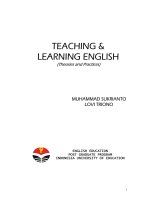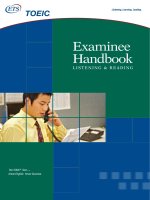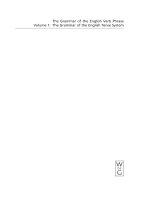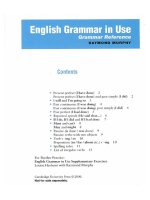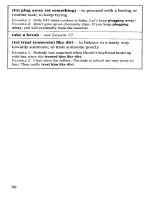Read know english 1 pdf
Bạn đang xem bản rút gọn của tài liệu. Xem và tải ngay bản đầy đủ của tài liệu tại đây (465.77 KB, 6 trang )
53. Question type: inference
Choice a is correct. Lines 18–19 state that when the first migrating birds were spotted, the fur traders
and Native Americans “all joined in jubilant welcome to the newcomers.” Therefore it can be inferred
that their relationship was a friendly one.
54. Question type: detail
Choice f is correct. There are many groups mentioned in association with the migrating birds, but line
34 (“bird investigations are made by the U.S. Fish and Wildlife Service”) is where you will find the
answer to this question.
55. Question type: generalization
Choice c is correct. Lines 43–44 explain that the role of the Survey was to collect data on migrating
birds before the Fish and Wildlife service was established.
56. Question type: detail
Choice j is correct. Lines 22–24 state that birds ate the insects that were troublesome to farmers, there-
fore were not threats to the birds.
57. Question type: vocabulary
Choice c is correct. The preceding lines explain how the arrival of the birds signaled a change in season
and the start of celebrations, therefore even if you do not know the meaning of the word, you can
assume that the imminence of spring, means that spring was soon to arrive.
58. Question type: detail
Choice h is correct. Although the European fur traders appreciated the migrating birds, they did so
because they indicated the arrival of spring, and were around before the increasing population of
North America referred to in lines 17–19.
59. Question type: cause and effect
Choice a is correct. Immediately preceding the following statement: “We soon realized that our migra-
tory bird resource was an international legacy” (lines 25–26) is a list of reasons people appreciated the
migrating birds, and it does not include their being a source of food.
60. Question type: detail
Choice j is correct. If you only read the beginning of the last paragraph, you might think the answer is
choice g, but if you continue reading, you learn that many others help the Fish and Wildlife Service.
SYLVIA
61. Question type: generalization
Choice a is correct. The first paragraph gives us the best clues as to Sylvia’s mood in the entire passage.
The fact that she has pulled the curtain and looked through the window is a good example of someone
who is anxious.
62. Question type: inference
Choice h is correct. With only the last sentence of the last paragraph, “Glancing at the birds and up
through the skylight at the limitless outdoors keeps her mild claustrophobia at bay,” we know that she
enjoys working in a space that feels open, making h the best answer.
– ACT READING TEST PRACTICE–
244
63. Question type: detail
Choice a is correct. When Sylvia looks out the window, what she sees makes her think of “conditions
that often precede a summer thunderstorm,” which she has always been afraid of. Therefore, the best
answer is choice a, ominous.
64. Question type: inference
Choice f is correct. In lines 21–22 we learn that “that the idea of sharing the apartment has actually
begun to repel her” in addition, she is happy that most of the time at work she has the office to herself
and that makes her happy. With these two facts in mind, we can assume she does not like to be sur-
rounded by people.
65. Question type: inference
Choice d is correct. All we really know about the specifics of Sylvia’s job is that she is a typist at a natu-
ral history museum. We do not know if it requires “concentration and attention to detail,” so choice a
is not a good choice. Her workplace is light and airy, but nothing in the passage suggests that Sylvia
wants for something better, in fact she is quite content with her job, making choice b a bad choice as
well. Sylvia is happy that her boss is not often in the office, so we know that she unlikely to have a love
affair with him, and so choice c is not a good choice, either. We do know that Sylvia does not like to be
around other people, and the stuffed birds do go along with that personality trait, therefore choice d is
the best answer.
66. Question type: detail
Choice f is correct. In lines 12–13, we learn that when Lola called,“the moment for saying the apart-
ment was no longer available slipped past,” meaning that she wanted to tell her but missed the oppor-
tunity, making f the best answer.
67. Question type: vocabulary
Choice c is correct. In many cases, vocabulary questions will require you to give nonstandard defini-
tions, and this is a good example of such a case. You probably know that the standard definition of
exhausted is tired, but as it is used in the passage it means something else. Sylvia refers to her trust
fund as “exhausted” and since we know that she is taking a roommate because she is running out of
money, choice c is the best choice.
68. Question type: detail
Choice g is correct. It is true that Sylvia could not afford the rent, but this does not answer why she did
not leave the house, but rather why she wanted a roommate. Choice h is in fact the reason why Sylvia
wants to leave. Lola was late for the appointment, so Sylvia believed that she could leave without being
rude, making choice j a bad choice. Lines 19–20 answer the question by stating “if a storm comes, she
wants to be at home in her own place.”
69. Question type: inference
Choice c is correct. We know in this paragraph that Lola is late for the appointment she made with
Sylvia, and because Sylvia considers leaving instead of waiting patiently, the best answer is that she is
irritated.
– ACT READING TEST PRACTICE–
245
70. Question type: detail
Choice h is correct. This very first line states that Sylvia is looking out the window and relays what she
sees, therefore, it is her viewpoint.
ULYSSES S. GRANT MEMOIRS
71. Question type: generalization
Choice b is correct. We know that statement I is untrue because line 20 states “the people of the
North had no particular quarrel with slavery.” Immediately following, the same lines also disprove
statement III.
72. Question type: cause and effect
Choice f is correct. Lines 19–28 establish the argument that rapid transit was a factor, and lines 20–22
show that the North’s unwillingness to legally support slavery. Although some Northerners would
agree with statement III, nowhere in the passage is this stated.
73. Question type: main point
Choice b is correct. The author agrees with the statement in line 3: “A state half slave and half free can-
not exist,” which essentially means the entire country must be for or against slavery.
74. Question type: cause and effect
Choice h is correct. The passage says that because of the Fugitive Slave Law, Northerners were required
to chase down runaway slaves. Later in the passage it says that the North was “not willing to play the
role of police for the South” (lines 21–22), therefore the best answer is that it forced the North to
enforce laws it did not believe were right.
75. Question type: vocabulary
Choice d is correct. Because it is clear that the North did not approve of the Fugitive Slave Law, the
power they would be seeking would be to “remove” such laws from the books.
76. Question type: detail
Choice j is correct. The answer to this question is found in line 13, simply put “they saw their power
waning, and this led them to encroach upon the prerogatives and independence of the Northern States
by enacting such laws as the Fugitive Slave Law.”
77. Question type: generalization
Choice b is correct. Lines 31–33 have the answer to this question. Be careful not to use any outside
knowledge of the Civil War, in this case, choices a and d are in fact correct, but they are not discussed
in the paragraph mentioned.
78. Question type: generalization
Choice f is correct. The author describes the U.S. as expanding in size, wealth and population in lines
43–44, and then line 45 claims Europe may think the United States would threaten their peace.
Another way of saying this is that they are threatened by our unified strength.
79. Question type: inference
Choice a is correct. Because Grant goes on to say that it “would part the moment the slightest strain
was brought upon it,” means that the only appropriate answer is weakly connected.
– ACT READING TEST PRACTICE–
246
80. Question type: point of view
Choice h is correct. In lines 40–41, Grant, in effect, says that we should “avoid war,” which makes
choices g and j incorrect. In lines 29–30, he says that we are better off after having the war, which
makes choice f incorrect, and h the best choice.
– ACT READING TEST PRACTICE–
247
Overview: About the ACT Science Reasoning Test
The most important thing you should know about this test is that it is not a science test, but instead a rea-
soning test. Unlike tests that you may have taken in high school, the ACT Science Reasoning Test does not
assess your knowledge of a particular science topic. Rather, it is designed to test your ability to understand
and learn scientific material. During this test, you will be asked this interpret, evaluate, analyze, draw con-
clusions, and make predictions about the information presented to you. In fact, whether the passage is about
biology, chemistry, earth and space science, or physics will not matter. You will be provided with all the infor-
mation you need, right in the passage.
Some science topics that you might already be familiar with include:
Biology
■
the structure of cells
■
molecular basis of heredity
■
biological evolution
■
interdependence of organisms
CHAPTER
ACT Science
Reasoning
Test Practice
6
249
